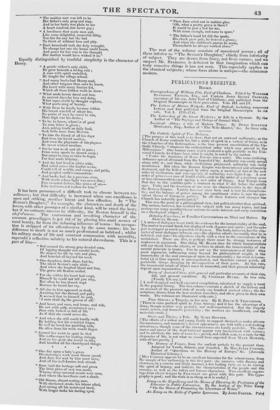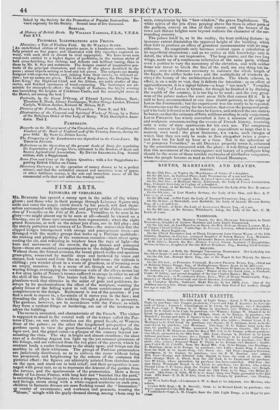PUBLICATIONS RECEIVED.
BOOKS.
Correspondence If Pitt, Earl of Chatham. Edited by WILLIAM STANHOPE lAYLOR, Esq , and Captain JOHN BERRY PRINGLE, executors of his son, John Earl of Chatham; and: published from the Original Alanuseripts in their possession. Vols. Ill. and IV.
The Letters of Horace Walpole, Earl of Orford; including numerous Letters now first published from the Original Manuscripts. In six vols. Vol. I. 1735-1745.
The Letter-bay of the Great Western ; or Life in a Steamer. By the Author of " The Sayings and Doings of Samuel Slick."
innisjbyie Abbey; a tale of Modern Times. By DENis InNArtue 31onianTr, Esq., Author of " The Wife-Hunter," &c. In three vole.
The Catholic Spirit of 7',..ae
[The purpose of this work 1.; to show, that not an outward uniformity, as the Church of Rome contends for, but a unity of spirit in a variety of forms, as itt the Churches of the Reformation, is the true present constitution of the Ca- tholic Church, whatever the ecclesiastical order which may prevail in the Millennium." One human cause which rendered a split probable in the Uni- versal Church, let it have been what it might, is noted by the author. " Under the dominion of Home Europe was a 'ty. The same civilizing influence spread all round from the Imperial City. Authority was easily spread along with it ; and thus, whit,. civilization progressed, authority was easily maintained. But when the lint ian Empire was dismembered and ultimately destroyed, and the field occupied by tither races, a number of foci of the new order of civilization, and contetoteally of authority, were lighted up. A new order of princes—a race of feudal chiefs, each in the midst of a territory more or less circumscribed—set aping a new order of things. And Europe from that day to this exhibits quite a contrast to what it dia befiwe the middle ages. Unity and the dominion if one were its characteristics in the days of the Boman Empire. Variety has ever since been and is now its characteris- tic ; stud the balance of power ani.mg its constituent states is now the pre. valent theory of European politic,. In all these features and changes the Church ha,: naturally partieipated." This was the germ of a philosophical view, but political rather than spiritual. The author, however, has overlaid, his subject with too many topics, and has perhaps too many peculiarities or notious to excite interest and carry conviction Ull a theological subject.] ././o/yiloy Ert'reises; or Familiar Conversations on Mind and Matter. By
SANII cm BLAIR.
[A series of dialogues to set thrill the evidence for the immateriality, of the soul. The matter is second-hand, but displayed with elegance and spirit ; and the sub. jeer is stripped as much as possiltle of dryness. The book, however, has the cha- racter of most dialogues between tole—the objector admits too readily that he is defilited, and states his objections chiefly with a view to the convenience of the maintainer. There are alSO, as perhaps there must be, strange instances of weakness in argument. One thing Mr. BLAIR does for which Immaterialists will not thank him—he admits, or inclines to admit, the immateriality of the mental prinriple in brutes. Can lie not see the consequences of this? One great argument, influencing many beyond its philosophical weight, is the immortality of the soul consequent upon its immateriality ; for what is imma- terial (it is thus argued) is uncompounded, and therefore cannot perish, all perishable things decaying by decomposition of their parts. At this rate, the immaterial minds of brutes must be immortal, and their present inferiority depend upon organization ] Ruins of Ancient Cities; with general and particular Recounts of their rise, fall, and present condition. By CHARLES BUCKE. IR MO 1/01S. (Family Lii.rary.) [A well-designed and well-executed compilation, calculated to supply a want in the popular library. The two volumes contain a sketch of the history and. an account of the present state of nearly one hundred ancient cities; the de- scriptions drawn from the best modern travellers, and often given in their own words. The volumes are illustrated with cuts.] _Nina Sibrza ; a Tragedy, in live acts. By R. Zoiecti S. TnounnTotf. [Them is some poetical spirit in Nina Sybrza; and it has the advantage of it story, though neither very probable nor well-constructed. But the tragedy wants actiou, and dramatic probability.; the motives are insufficient, and the materials crude.] Strive and 7'brire; a Tale. By MAItli how-err. [The efforts of a widow and young family to support themselves under adverse circumstances, and maintain a decent appearance, are told with a real-looking minuteness, though some of flue circumstances are hardly probable. The elm. racter and career of the dead husband appear very inconsistent with nature; and to attribute the ruin ()f a careless, proud, and selfish man, In a taste forwr rt h7e, elegancies of life, is not what we should. have expected from 111ARY 110 with all her gravity.] The History of France, from the earliest periods to the present time. Adapted for Youth, Schools, and Families. By Miss JULIA CORNER, Author of " Questions on the History of Europe," &c. (Juvenile Historical Library.)
[Miss CORNER appears to be an excellent historian for the school-room, from the sample of her authorship in this first part : she narrates with fluency and clearness, in a concise and lively manner, a few leading facts so as to convey
the spirit of history, and indicate the characteristics of the people and the country, as well as the rulers smith famous characters. Two excellent engrav- ings from clever designs by FRANKLIN are given with this part. The typo- graphy is good ; and the work is as cheap as it is useful.] Essay on the Expediency mid the Means of Elevating the Profession ft.hie Educator in Public .Estimation. By the Author of the Prize Essay "On the Means of Promoting the Literature of Wales."
An Essay on the Evils qf l'opular Ignorance. By JOIIN FOSTER. Puts
Elea by the Society for the Promotion of Popular Instruction. Re- vised expressly for the Society. Second issue of five thousand.
SERIALS.
A History of British Birds. By WILLIAM Yannum,, F.L.S., V.P.Z.S. Part XVI.
PICTORIAL ILLUSTRATIONS AND PRINTS. 11.fannkm; a Tale of Flodden Field. By Sir WALTER SCOTT. An embellished edition of this popular poem, in a handsome octavo, beauti- fully printed on fine paper, and illustrated with fifty vignettes engraved on wood, with such skill as almost to rival copperplate. We have never seen wood-cuts carried to a higher degree of indiction, in the various styles of bold cross-hatching, free etching, and delicate and brilliant toning, than in these by Mr. S. Sur and assistants. The designs consist of imaginative por- traits of the principal characters, and views of the places described in the poem ; minor objects serving as head and tail pieces. Phe subjects are mostly designed with superior talent, and, judging from their variety, by different at, tists ; but no names arc given. The heads of King James, the Douglas, "the Lion-King.," the Highland Chief, and the Abbess, are noble studies of dia- meter, and finished specimens of wood-engraving. The landscapes are ad- mirable for atmospheric effect the twilight of Norham, the brig:it evening sun burnishing the heights of Crichtoun Castle, and the moonlight scene in the Hostel, are among the best.]
Portraits, by the Count D'Orsay, of Edward Lytton Bulwer, Bart., Theodore E. Hook, Albany Fonblanque, Walter Savage Lander, Thomas Carlyle, William Jordan, Richard M. Milnes, M.P.
Pictures of the French, Drawn by Themselces. Parts X. and XI. Illustrations of the Corporal and Spiritual Works If 31-crey, by a Sister
of the Religious Order of Our Lady of Mercy. With Descriptive Anec-
dotes. Part L
PAMPHLETS.
Remarhs on the Management qf the circulation, and on the Condition and Conduct of the Bank of England and of the Country Inners, during the year 1830. By SAMUEL JONES LOYD, The Prosperity of the Landowners not dependent on the Corn-Laws. By
TUOIDAR JEVONS.
Reflections on the Operation of the present Scale of Duty fir regulating the Importation of' Foreign Corn, addressed to the Borders of Kent and Sussex Agricultural Association. By DAVID SALOMONS, Esq. Second edition, with a Supplement.
Some Pros and Cons of the Opium Question ; with a few Suggestions re- garding British Claims on China.
Monetary Currency; or the operation of money shown to be a perfect science, and that the unlimited amount and uncertain issue of paper, or other fictitious money, is the sole and immediate cause of all the commercial evils that now afflict the trading world.



























 Previous page
Previous page